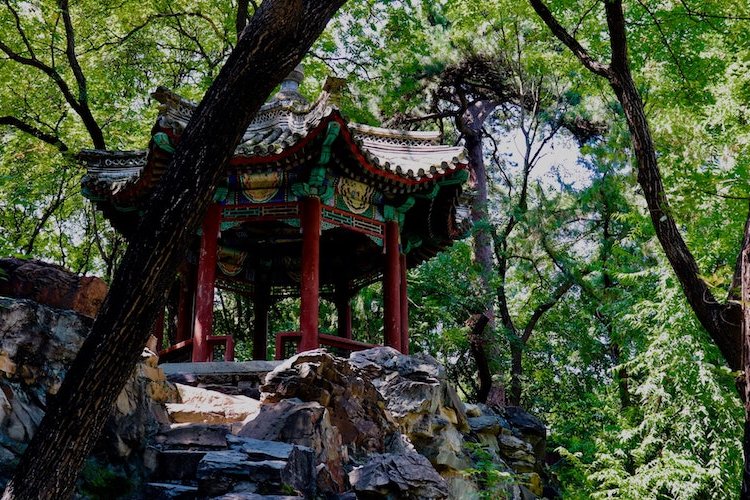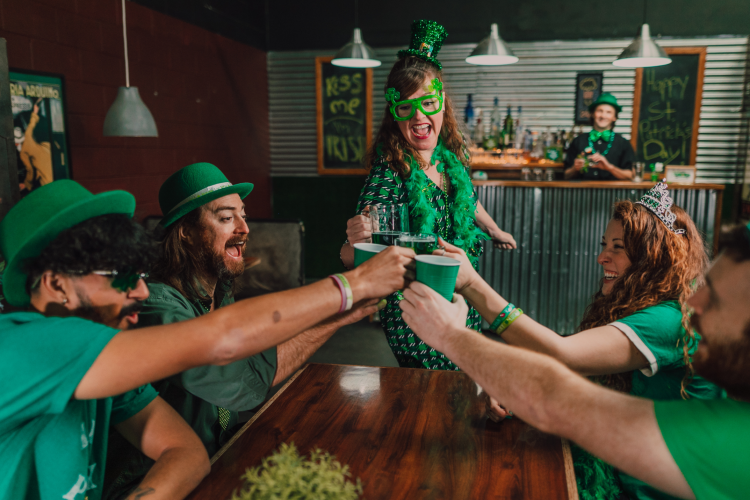The Extraordinary Life of Ying Ruocheng
Here’s one to add to the list of China’s 2009 anniversaries: June 21 marks the 80th anniversary of Ying Ruocheng’s birth, and the 38th anniversary of the day he was released from prison. The actor, playwright, and diplomat went from a prison cell during the Cultural Revolution to the office of vice minister of culture during the late ’80s. He played the prison governor in the film The Last Emperor, but off camera, it was his diplomacy that allowed the movie to be filmed in China at all.
After Ying was diagnosed with cirrhosis of the liver, writer Claire Conceison spent several summers at his bedside, recording over 100 hours of oral history she would turn into his autobiography, Voices Carry: Behind Bars and Backstage during China's Revolution and Reform. Now, five years after his death, Ying’s autobiography is being published in both English and Chinese. We asked Conceison about the man behind the story.
Ying Ruocheng plays Lama Norbu in Little Buddha
How did you and Ying Ruocheng collaborate on making this book?
I met Ying Ruocheng in 1991, and I saw him again on the set of his son Ying Da’s sit-com I Love My Home (Wo ai wo jia) in 1994. Soon after, I suggested he write his autobiography. He did begin to type some recollections of his arrest in 1968 and subsequent imprisonment, but became too ill to continue writing. In 2001, we began recording his memories on audio and videotape. We did this for three summers, (and) collected over 100 hours of oral material.
Since the book was published several years after Ying’s death, was it challenging to stay true to what you think Ying wanted for his autobiography?
Ying Ruocheng and I spent a great deal of time during 2001-2003 talking about his wishes for the book—its tone and content, its structure, its publication, its readership—and we both knew he was going to die before the project was completed, so I am quite certain that my efforts in writing and publishing (and promoting) the book are precisely what he wished, and whenever I made decisions about the book, my first thought was always, “What would Ying Ruocheng want?”
Ying has said "The tragedy of our family is, in fact, the tragedy of the Chinese people."
I would rephrase this to say that “The story of the Ying family is the story of 20th century China” because that statement is an apt reflection of what a reader of Voices Carry comes away with: a deep understanding of this extraordinary man and his family history and legacy, but also a much deeper understanding of the political upheavals and socio-cultural shifts in China during the entire 20th century, inclusive of the fall of the Qing, the Japanese occupation, Liberation, the Cultural Revolution, the era of opening and reform, and rise of market forces. In both his life experiences and his approach to telling readers about his life, Ying is remarkably unique—and yet, at the same time, his story serves as a broad portrait of a vast cross-section of China’s citizens and events.
For example, his account of his childhood summers at the family residence in Warm Springs reveals much about both the privileged vacationers and the rural community surrounding them; his trips to bring his father food and clothing in prison during the 1940s put him in contact with the most destitute residents of Beijing; and during his own three years of incarceration during the Cultural Revolution, he spent his time and energy recording the stories of his fellow prisoners, who were peasants with practical life skills that Ying Ruocheng felt he could benefit from mastering.
Left: With Arthur Miller during their collaboration on Death of a Salesman
For those who are familiar with Ying Ruocheng’s career, what aspects of his life will they be surprised to discover in this book?
Usually the aspect of Ying’s life that readers find most surprising is that he served as a government informant for most of his life together with his wife, reporting on the very foreigners with whom they developed such close and genuine friendships. Ying Ruocheng was reluctant to discuss his work as a “spy” at length in the book, because he feared this paradox of patriotism and Western sensibility would be irreconcilable to foreign readers, but the reaction has been quite otherwise.
Ying Ruocheng has never before reflected at length about his prison experience or his childhood, so there is rich material in both of those parts of the book that will shed new light on both Ying and China. Also, Arthur Miller wrote a whole book about his experience of collaborating with Ying Ruocheng on Death of a Salesman in 1983, but this is the first time that Ying has recounted that watershed international experience from his own perspective.
What was the role of the theater community in this period of China’s history? What sort of figure was Ying within this community?
The theatre community—particularly the Beijing People’s Art Theatre—played a crucial role both politically and culturally in 20th century China. Ying Ruocheng and his wife began their acting as college students at Qinghua University—where theatre served as a window to the West, to English language, to the universal human soul. Reading and performing plays- here I mean spoken dramas, or huaju, as opposed to indigenous classical operatic performance forms- was revolutionary for intellectuals like Cao Yu and Hu Shi during the May Fourth Movement, and it remained so for the next generation like Ying Ruocheng and Yu Shizhi during the heady days of the civil war and revolution. During his senior year at Qinghua, Ying read Death of a Salesman for the first time, just after it was published in the United States, and became determined to stage it in China one day, a dream that would be realized thirty years later.
After Ying joins the Beijing People’s Art Theatre as a founding member in 1950, we see the profound impact of writers like Lao She with his play Teahouse; and in 1991, when Ying has just completed his post as China’s vice minister of culture, we see audiences cheering at performances of Major Barbara because Ying dared to publicly ridicule politics in one searing line of the play. Those moments in the theatre in China are not inconsequential—they are also played out in the streets, in people’s homes, and on the international political stage. Theatre matters and “signifies” in China in a way it does not elsewhere precisely because the government is wary of it and puts restrictions on it, but it also bears meaning more broadly as a barometer of China’s social conditions and the human spirit. Ying in the play Teahouse
What did Ying’s job as vice minister of culture during the late ‘80s involve? What was it like to have a job that intertwined culture and politics at that time?
Ying Ruocheng was hand-picked by Hu Yaobang for his post, and worked directly under Wang Meng. These were true reformers, and in Ying Ruocheng, they acquired not only a fellow reformer, but one with unprecedented skills in language and diplomacy. There has never been, before or since, an official like Ying Ruocheng who could communicate so broadly and effectively with foreigners, both within China and during his travels abroad. Foreign diplomats and artists felt immediately at ease with Ying and trusted him, and this led to a multitude of successful cultural exchange projects both in China and overseas. Ying also implemented economic reforms in arts policy and personally supervised major events like international arts festivals.
Incidentally, readers of the book who are already somewhat familiar with Ying will be surprised to learn that he never left China until the age of 51, even though he had long been considered an expert “cultural ambassador”—his knowledge about and deep understanding of the West and Westerners was developed from his early study of English in missionary schools and his vast reading of foreign literature, as well as the sensibility passed on from his grandfather, a leading Catholic Manchu intellectual of the post-Qing era, and his father, who was educated in Europe from the age of 12 until he was 20.
Ying Ruocheng could have chosen at any moment after the Cultural Revolution to relocate and live abroad—but he never left China, even when so many others did. He was determined to make a difference by staying, and this was not necessarily the easier road to take.
How does Ying’s portrayal of China differ from other perspectives in books written on the same time period?
One difference is, as I just mentioned, the subject’s vantage point from within China. Most China memoirs in English—particularly if focusing at least in part on the Cultural Revolution—are written from the perspective of citizens who relocated abroad and are “looking back” at China both temporally and geographically. Ying Ruocheng’s account is quite unique as a memoir in English intended for Western readers, but narrated from the confines of Beijing—in this case, quite literally the confines of a hospital bed in Beijing. So, Ying’s psyche is situated squarely in his home city and self-consciously as he is exiting from this world.
But beyond that, I must say it is his sense of humor that is quite unique. Usual prison narratives by Chinese autobiographers do not include jokes and pranks and recognition of any benefits to being imprisoned—and yet, Ying’s sense of hope does not ring false, and his account of sly tricks and adventures in his prison experience does not detract from the suffering that he and others experienced, though it does recontextualize it. Furthermore, his sense of hope, determination, and levity is not that which is gained in retrospect as one might anticipate—it was actually how he managed to regard his experience in the actual moment he was living it. This is quite rare, and is a result of his unique family background and education—but it is also a special gift that I believe comes from God.
Was Ying’s catholic faith a strong factor in his life? How did his faith in religion mesh with his faith in China?
Ying Ruocheng was not a practicing Catholic and did not necessarily believe in God and salvation and the teachings of the Catholic Church—but the impact of his forebears’ Catholic faith and the Catholic family culture in which he was raised had a profound impact both on his personal development and his deep understanding of the Judeo-Catholic tradition in the West and its impact on literature, culture, and social customs.
One day when I arrived at the hospital in 2003, Ying greeted me by singing a Catholic hymn. He knew I was a practicing Catholic, and even though he did not follow the faith as an adult, he loved talking to me about his Catholic family and experiences because he knew I was from the same family culture and that I love the Catholic Church and faith.
There is an interesting story about how his family, which was so devout in its Catholicism for two generations, more or less fell away from the faith. It is only partly a matter of political shifts in China—the other reason is related to the death of two of his teen-aged siblings from tuberculosis and the fact that a friend told his mother they had been taken to heaven by God because they were so devout… she feared the loss of more children and immediately relaxed the Catholic practices in their home. Had Ying Ruocheng continued to live as a practicing Catholic, it most certainly would have negatively impacted his artistic and political career.
Is there anything else you’d like to mention about the book, or your talk?
June 21, 2009 is the 80th anniversary of Ying Ruocheng’s birth. June 21 is also the day that Ying Ruocheng was released from prison—he completed a three-year prison term during the Cultural Revolution on June 21, 1971, his forty-second birthday. He recounts in his autobiography that his father was also in prison on his 42nd birthday, at the hands of the Japanese for his role in the resistance movement. Both father and son follow in the footsteps of grandfather Ying Lianzhi (1866-1926), who was part of the Reformist movement and had to flee Beijing in 1898 to avoid execution, hiding in Hong Kong, Vietnam, Yunnan, Shanghai, and Tianjin before returning to Beijing after Empress Dowager Cixi’s pardon in 1902. It was actually at that moment that the family surname became “Ying,” as explained in Ying Ruocheng’s narrative.
Cleverly resisting the usual linear structure of an autobiography, Ying begins his tale with his three years in prison during the Cultural Revolution, and then flashes back to his grandfather’s youth and his father’s circumstances before detailing his own childhood education, university experiences at Qinghua, and extraordinary career as an actor, translator, director, and political figure, as well as China’s most renowned “cultural ambassador” (wenhua dashi). Because of this unique structure, we first meet Ying Ruocheng as a mischievous prisoner, playing pranks on guards and devising ingenious strategies to ensure his survival, before we encounter the younger self whose adventurous tendencies ensured expulsion from not one, but three, Catholic middle schools.
The original book in English (published by Rowman & Littlefield) is available at The Bookworm and also on Amazon.com The Chinese version of the book is called Shuiliu yunzai 水流云在 published by CITIC Press and will be available at bookstores throughout China in June.
Claire Conceison will be speaking on Ying's life at The Bookworm on May 5 at 7.30pm.






